The Department of Plant Sciences, Microbiology and Biotechnology (College of Natural Sciences (CoNAS), Makerere University) is hosting Prof. Mark Pitkin Simmons from Colorado State University in the U.S.A as a Fulbright Scholar for the academic year 2016/2017. He will be based at the Makerere University Herbarium. During his stay, Prof. Simmons as a visiting professor will: teach both graduate and undergraduate courses in phylogenetics, scientific writing and scientific process; give out-of-class scholarly lectures to the university community; and undertake joint research with staff.
The collaboration is expected to strengthen international linkages for Makerere University staff as well as foster professional growth. Prof. Simmons will work closely with Assoc. Prof. Esezah Kakudidi and Dr. Mary Namaganda, Deputy Curator of the Makerere University Herbarium. Prof. Simmons is the first visiting Fulbright Scholar to the department. His research project while at Makerere is titled, ‘Gene flow in a recently cultivated plant lineage: the spread of catha edulis (qat) in Uganda’. In the Africa region, he has previously conducted research in Ethiopia and the East African Herbarium in Nairobi, Kenya.

Prof. Simmons defines his research interests as thus, ‘my research program consists of two interrelated components: phylogeny and taxonomy of the flowering-plant family Celastraceae (the spindle-tree family), and conceptual aspects of molecular phylogenetics (using genomic data to reconstruct evolutionary relationships among species). The Celastraceae are a large family, primarily of lianas, shrubs, and trees with a sub-cosmopolitan distribution. Within the family, the aril has undergone tremendous diversification and ranges in form from a mucilaginous pulp to a broad wing. I am working to assess overall relationships within the family and track the pattern of aril diversification. For my conceptual research, I am working on problems such as: how alignment changes with increasing genetic distance, the trade-offs of using either nucleotide or amino acid characters, the incorporation of duplicate genes into phylogenetic analyses, the measurement of phylogenetic signal, and the use of morphological characters when entire genomes are sequenced. Molecular phylogenetics is playing an increasingly central role in biology, from inferring the diversification of multigene families, to tracking invasive species, conservation of protected species, as evidence in criminal investigations, and fighting bioterrorism.’
For more information about Prof. Simmons: http://sites.biology.colostate.edu/simmonslab/Simmons_CV.pdf http://www.biology.colostate.edu/people/psimmons/ http://sites.biology.colostate.edu/simmonslab/

